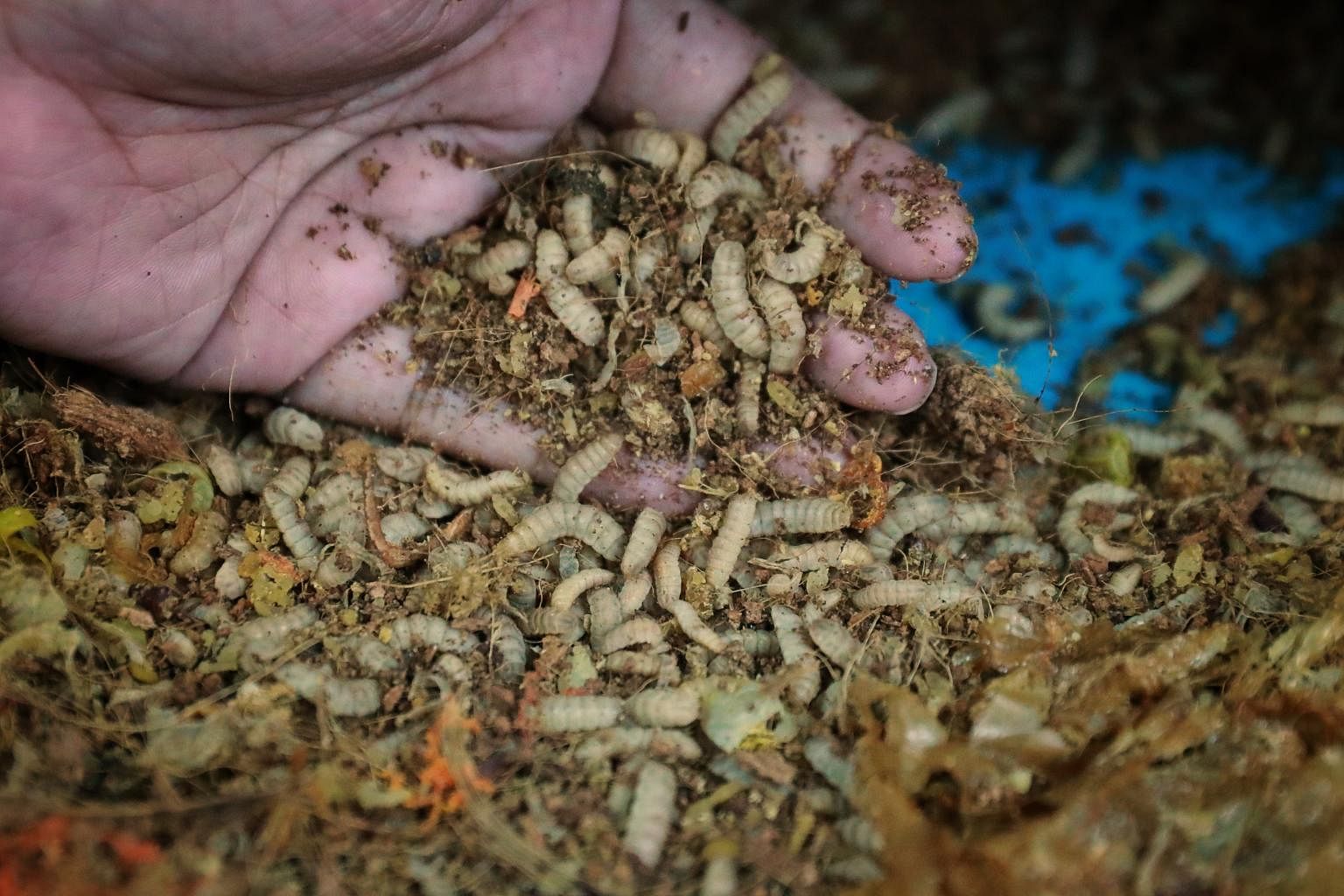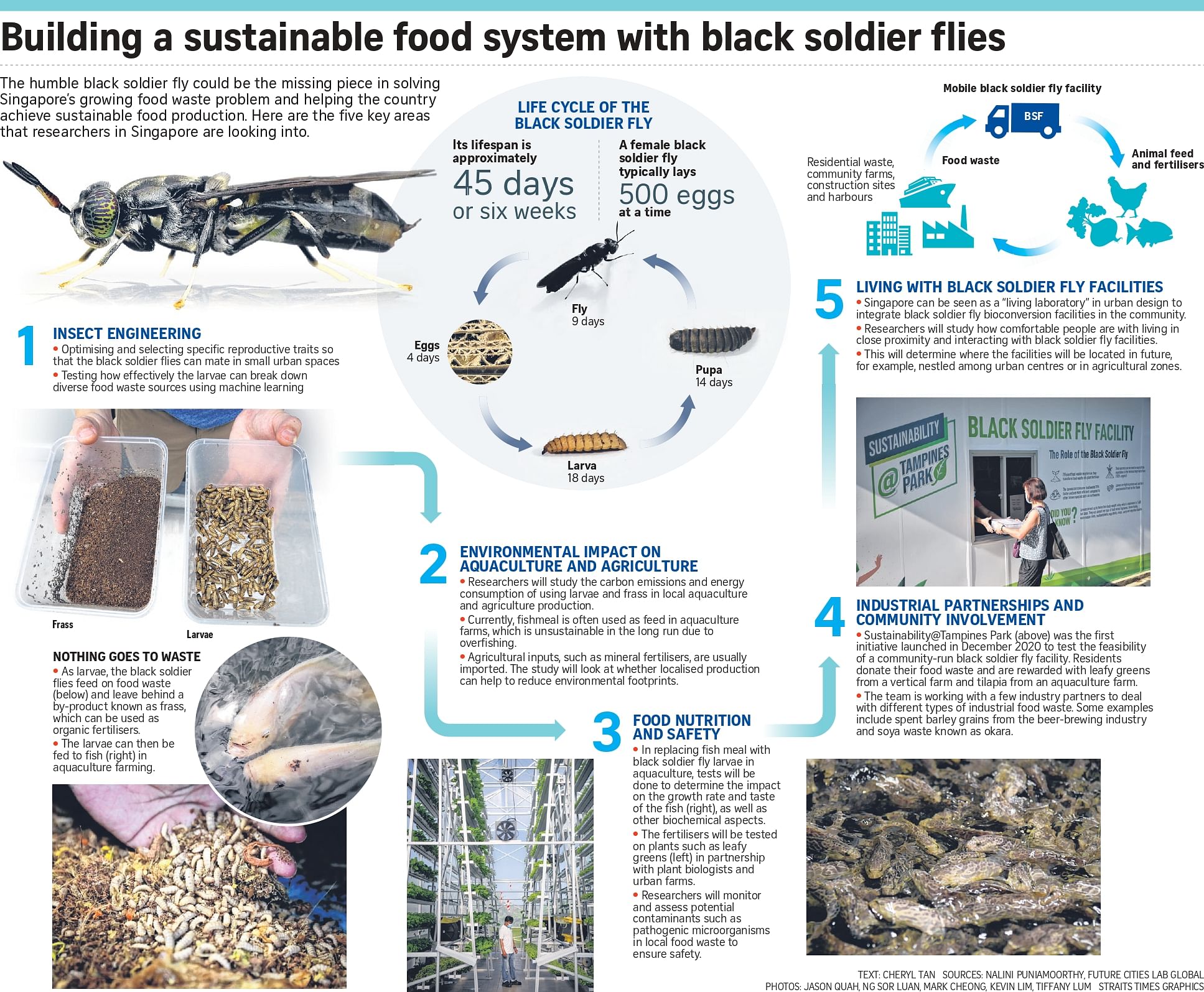SINGAPORE - Imagine a future where food waste is converted into nutrients for food production, all in a work of magic by the ubiquitous black soldier fly.
This is exactly the vision that an interdisciplinary team of researchers hopes to realise, as they develop a blueprint to integrate food waste management and sustainable food production in urban settings like Singapore.
Assistant Professor Nalini Puniamoorthy from the National University of Singapore's Department of Biological Sciences, who is leading the project, told The Straits Times that Singapore faces a two-fold challenge in its journey to food security, as the issue is not only with reducing food waste, but also with increasing food production in a sustainable way.
Nearly 700,000 tonnes of food waste is incinerated on a yearly basis, while efforts to grow Singapore's own local produce are very heavily dependent on imported agricultural inputs such as mineral fertiliser and animal feed that increase the cost of local food production and could have an adverse impact on the environment, Prof Nalini said.
"So we're trying to marry these problems... and we think it is feasible by trying to take advantage of what nature already does, and that is to use these flies that are nature's very own recyclers," she said.
As larvae, black soldier flies are able to consume up to four times their body weight in food waste daily, converting the waste into a by-product known as frass - which can be used to substitute or supplement commercial fertilisers in agriculture.
The larvae, being rich in protein and fats, can be used in animal feed formulations for poultry and aquaculture diets.
The project, which Prof Nalini led with Professor Stephen Cairns from the Singapore-ETH Centre's Future Cities Lab Global programme, is done in collaboration with researchers from the Nanyang Technological University (NTU) and ETH Zurich.
The three-year project is funded by the National Research Foundation, under its Campus for Research Excellence and Technological Enterprise programme.
Prof Cairns said: "Designing fully circular food systems for high-density cities like Singapore requires experimentation at different scales.
"Larger centralised black soldier fly larvae processing facilities could be integrated with food production areas to reduce waste at source, and further downstream at hotels and wholesale retailers, while compact decentralised facilities could be linked to restaurants, hawker centres and urban farms. Even smaller, mobile units might cover more ground in residential areas, community farms, and construction and harbour sites," he added.
Singapore is the first country in Asia that is studying the possibility of rolling out black soldier fly facilities on a national scale, though such integrated food ecosystems are more established in European suburban and agricultural towns, said Prof Nalini.
She added that the "large-scale endeavour" will also bring Singapore closer to its 30 by 30 goal of increasing the capability and capacity of growing 30 per cent of its food needs locally by 2030.
The project, which began this month, will span five interrelated themes, each covered by experts in insect rearing, urban design, sustainability, as well as food safety and nutrition.
These themes are:
1. Insect engineering

One of the challenges faced by black soldier flies in an urban environment like Singapore would be their reproduction, as they need a large space to mate and special conditions to allow for high fertility rates, said Prof Nalini, who has a background in evolutionary genomics.
"So what we've been doing... is optimising and selecting certain reproductive traits that enable them to mate in small spaces," she added.
The other area of research would be to test the black soldier flies on diverse sources of food waste using machine learning.
Professor Alexander Mathys from ETH Zurich's Sustainable Food Processing Group, told The Straits Times that this involves using real-time sensors to monitor larval behaviour and environmental conditions, along with different food waste inputs to determine the most efficient combination.
2. Co-living with the black soldier flies
Said Prof Cairns: "Recently, the idea of producing food in the city is becoming very important, as it is a key plank of sustainable future city planning... Architects often use this term - biophilic design - which means that we must learn from nature.
"But in my experience, architects and designers often only look at the forms, and they do so in a way where there's no actual tension between nature and the city."
In designing an integrated food system, however, there is a need to consider the "more unpleasant aspects" of biophilic design, such as the smell of food rotting, for example.
"How do people interact with the possibility of closing the loop (with these facilities)... which, of course, is smelly, dirty and perhaps has a kind of stigma attached to it," said Prof Cairns.
This would have a part to play in determining where these black soldier fly facilities are located - such as considering whether they are to be situated at the edge of the island, near an agricultural zone, or completely decentralised and located close to every hawker centre. It could also be a combination of all of the above, Prof Cairns added.
3. Environmental impact of using black soldier fly by-products for agriculture and aquaculture

To understand the benefits and costs of introducing black soldier flies to Singapore's food management system, Assistant Professor Janice Lee from the NTU's Asian School of the Environment will be studying factors such as carbon emissions and energy consumption of using frass or larvae from black soldier flies as an agricultural or aquacultural input.
For instance, this will involve studying whether having a more localised production for these inputs will be able to reduce carbon emission, as opposed to importing them.
To do so, data will have to be collected from those conducting agricultural and aquacultural activities, and from those who run black soldier fly facilities.
4. Food nutrition and safety
One big question which many Singaporeans will have is whether the quality of local food or produce will change.
To that end, the study will look at whether fish meal used for aquaculture farming, such as tilapia and barramundi, can be replaced with black soldier fly larvae, as the continuous use of fish meal is unsustainable for the environment, said Assistant Professor Joyce Ong from NTU's Asian School of the Environment.
Experiments will also be under way to look at the growth rate of the fish, as well as their biochemical aspects, such as the taste of its flesh, she added.
Frass, which is left behind from black soldier flies, will also be tested as a fertiliser for growing plants such as leafy greens, in partnership with plant biologists and urban farms, said Prof Nalini.
"We'll also be monitoring the soil microbial biodiversity and see if there are any benefits because black soldier flies' chitin (a fibrous material which functions as a scaffolding material for insects) has some anti-microbial properties too," she noted.
Local food waste streams will also be monitored for their nutritional profile, and to look out for any metal contaminants or pathogenic micro-organisms, to ensure food safety.
5. Expand industrial partnerships and community involvement

The final, but most important, part of the project would be to translate the research to both the industry and the community, said Prof Nalini.
The first such community black soldier fly facility was set up in Tampines over a year ago, in partnership with environmental consultancy firm Otolith Enrichment and Singapore Food Agency.
The team is also working with a few other industrial partners to deal with different types of industrial food waste, Prof Nalini added.
"What I envision in my rose-coloured glasses is that even when kids go to school, they will know how to separate their food waste after eating in the canteen, which will be given to the school garden for growing vegetables.
"And when they go back home, they see food waste, they're able to tell their parents that they're wasting food... Education goes hand in hand with application, and I think we can effect the change if we're able to show that (this entire system) will work," she added.




